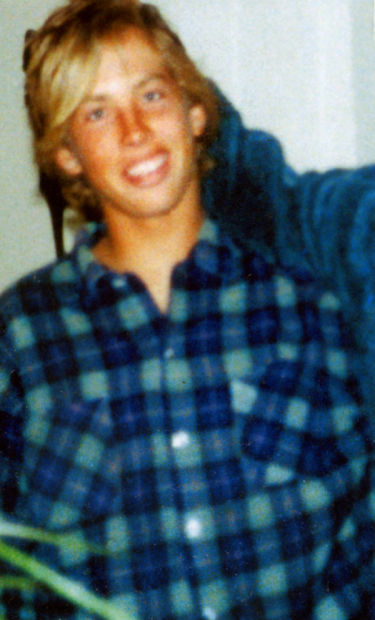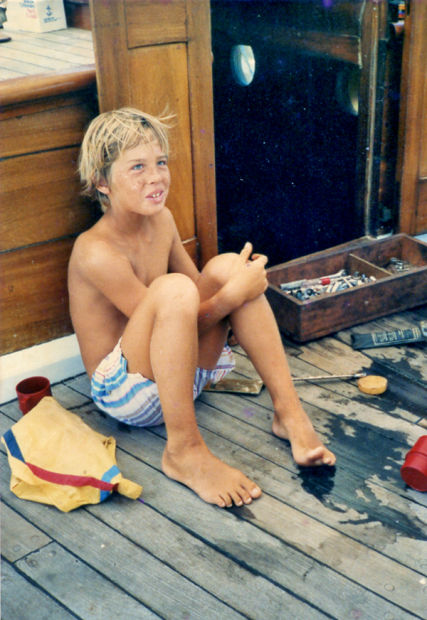Moore: ‘Trust in the process’


LIHU‘E — It took more than two years for the judicial system to convict Vicente Hilario, 26, of killing Aureo Moore, 34, who was shot several times from behind. On March 8, after two days of deliberation, a jury found Hilario guilty of first-degree murder and other charges, after a trial that lasted for more than four weeks.
“I was in the courtroom listening when the verdict came in, my emotions overtook me when I heard the word ‘guilty,’ tears started running down my eyes, tears because I missed my son,” said Aureo’s father, Robert Moore.
Moore said he never thought the day would come when he would see some type of closure on the shooting death of his son. Upon hearing the verdict, he leapt and ran out of the courtroom, he said.
“Trust in the process,” said Moore, echoing the words he heard many times from Neal Wagatsuma, the warden at Kaua‘i Community Correctional Center in Wailua.
Many years ago, Wagatsuma made a lasting impression on Robert Moore, who spent more than seven years at KCCC on drug charges that inflated after he was caught at Honolulu Airport trying to flee the country. To this day, not a week goes by without Moore thinking about Wagatsuma’s words, he said.
“Today, (Wagatsuma) is responsible for Vicente Hilario’s safety,” Moore said.
Hilario’s sentencing is set for June 13, when he will be facing life in prison without possibility of parole.
He has been at KCCC since his arrest shortly after the shooting death of Aureo on Dec. 17, 2010, in broad daylight on a road next to Anahola Beach Park.
Aureo was ambushed and shot four times from behind at close range. None of the bullets hit a vital organ, and one of them only grazed Aureo’s torso. But when Aureo fell down, two more shots were fired at the back of his head, and despite efforts from lifeguards, who kept him alive until an ambulance arrived, Aureo died later at around 3 p.m.
After more than two years of evidence gathering, pre-trial procedures and delays, the trial of Hilario started on Feb. 5.
Moore said at first he was blocked from attending the trial, because he could have been called as a witness. But Deputy County Prosecutor Melinda Mendes cleared him prior to the trial.
“I was in the trial every day,” Moore said. “At times, it was very difficult looking at photos of blood and bullet holes in the back of (Aureo’s) head, if I was to stay.”
Moore said he had to let go of it all, and listened to all the evidence — some was allowed and some was not allowed, he said.
During trial, he said he watched several people lie, and it wasn’t difficult to figure out who was telling the truth and who was lying.
“Many got pulled into Hilario’s web of poison,” said Moore, adding that some had been threatened and asked to not say what they had seen.
Prosecutors were able to seek the first-degree murder conviction because Aureo was a witness in a Aug. 21, 2010, shooting robbery at a Safeway parking lot in Waipouli.
“Many were threatened the same as my son was,” he said. “Some lied to the end, trying to keep Hilario’s dark ways alive.”
Moore said Victim Witness Program Director Diana Gausepohl-White and victim witness counselor Jennifer Arashiro did an exceptional job assisting him during trial.
“These two people were so incredible; they were with me every day, from 8:30 a.m. to 4 p.m., for a month,” he said.
Also, Moore said he tried four times in the last two years to meet with former county Prosecutor Shaylene Iseri-Carvalho, but he was always directed to speak with former First Deputy Prosecutor Jake Delaplane. Moore said it took two meetings with Delaplane for the deputy prosecutor to finally release some information on the development of the investigation.
After Prosecutor Justin Kollar beat Iseri-Carvalho in the 2012 elections and took office in December, Moore said he met with Kollar a couple of times, and spoke on the phone with him several times.
To Moore, Hilario’s conviction was possible thanks to the countless hours put in the case by the Kaua‘i Police Department and staff at the Office of the Prosecuting Attorney, especially Mendes. Moore also thanked the county lifeguards for tending to Aureo right after he was shot, and going the extra mile to keep him alive until the paramedics arrived.
Following Hilario’s conviction, Honolulu-based defense attorney Keith Shigetomi said there would be many more chapters to go, to which Moore said it means appeals will be filled and attorneys will be making additional money.
“Everyone is trapped in Hilario’s dark web of poison,” Moore said. “Murder is OK if you are a defense attorney making a lot of money off your client or a family member trying to protect the guilty.”
Someday, he said, everyone will face the law of the universe, “where the light always overcomes and prevails the dark side.”
Hilario’s trial is over, and the fact that Aureo is gone remains, “but there isn’t a day that goes by that he tells me he is OK,” Moore said.
• Léo Azambuja, staff writer, can be reached at 245-0452 or lazambuja@ thegardenisland.com.
